Donizetti: L'elisir d'amore (Benini)
Introduction
Donizetti's 1832 offering for the Milanese theatre has become one of the best known operas, mainly for one particular aria that doesn't appear until the final scenes but also due its almost ridiculous sense of charm and abandon which many of his other works don't seem to posess. This production, although less 'staged', was also seen at last year's Proms.
The slightly cut-down plot is as follows.
In a small village in Italy (although some sources say it should be in the Basque country), a penniless peasant, Nemorino, is in love with Adina. Adina spends much of her time enjoying the embarrassment she causes him when rejecting his constant attentions. Adina reads the story of Tristan and Isolde to the assembled villagers, and Nemorino wonders whether the only way to gain Adina for himself would be through a magic potion.
To make things worse, the local regiment arrives in town and the pompous, but alluring (to himself, at least) Sergeant Belcore works his way though the village girls until he decides Adina is the one for him. Immediately proposing marriage, she neither accepts or declines him, but things are 'tentatively' set for six days ahead.
Dulcamara, a travelling quack doctor and salesman also arrives in town soon afterwards, and once he has won over the villages with a 'cure all', Nemorino sidles up and asks whether 'Isolde's love potion' is on the good doctor's menu. Funnily enough, it's one of his specialities and dispenses some into a bottle for Nemorino warning that its effects only take hold 24 hours later (letting the audience know that it's only a Bordeaux).
Nemorino drinks the lot, and having never drunk alcohol before becomes far bolder than he has been before. This boldness annoys both Adina and Belcore, and so they decide to get married that very evening as the regiment has been called away the following day. Nemorino panics, and searches for the doctor again. More 'elixir' is prescribed, but Nemorino has no more money so he enlists with the army for some ready cash.
Luckily for Nemorino, although he doesn't know it himself, an incredibly rich relative has died and left him the lot. The village girls get to hear of it and throw themselves at the astonished (and drunk) man. He believes it's the elixir, and so does Dulcamara who also knows nothing about the money.
Adina, who also knows nothing about the money, has paid off Nemorino's commission as she has secretly loved him for years and doesn't want him to get himself killed. Nemorino believes this is the elixir working again, but they both fall into each others' arms. Belcore is disappointed but has decided to drink as much of the elixir as he can himself, as it obviously works wonders.
Audio and Visual
No problems with either. The pit/stage balance is excellent and there is no loss of orchestral detail in Donizetti's more 'intricate' moments.
Extras
None on the disc, save the obligatory cast gallery and illustrated synopsis. The accompanying booklet contains a potted history of the opera's development from Susan Rutherford.
Conclusion
Annabel Arden's production of Donizetti's comic opera seems to have darkened things considerably by setting everything in what appears to be a Fascistic Italy, with little or none of the music's lightness reflected in what we see on stage. I suppose that there's little one can do with such a plot: "poor, but happy rustic villagers get taken for a ride by visiting quack, yet all is happy in the end", but operas like this don't need to make the audience feel awkward in the slightest. It is mostly escapist nonense set to rather fine music, yet it all looks as if Arden's thrown in a large pot of the 'neo-realism' greatly favoured by post-war Italian film directors.
Having said all this, the music itself isn't 'suppressed' being brilliantly executed by the LPO and ably directed by Maurizio Benini, who is pretty much the expert at conducting Italian repertoire from this period.
As Nemorino, Peter Auty (who first came to prominence when singing 'Walking in the Air' - no, it wasn't Aled Jones!), is a rather dour character, more full of rejection than hope in the future, yet his voice is fine. Not particularly 'Italianate', he dispenses with all the slides and affectedness that come with more stylised performances, but this isn't a bad thing at all as he creates a more realistic person which makes 'Una furtiva lagrima' all the more moving, once it's put back into context.
Ekaterina Siurina as Adina is also very good, yet seems to warm into the role as the performance goes on. The disc cover says that this was recorded over 2 nights, and as Siurina was taken ill in the first few performances, there may be remnants of the chest infection that made Glyndebourne headlines last July. Her 'Prendi; per me sei libero' though is absolutely stunning and proves there's more than that one tenor aria in this work.
(I may be wrong, but both Siurina and Ainhoa Garmendia, her replacement, are featured in the production pictures in the booklet, which caused me a bit of confusion, but is a nice touch)
As Dulcamara (Italian for 'bitter-sweet - if anyone wanted to know), the great 'opera buffa' role, Luciano di Pasquale is a little more ' buffa' than anything else, declaiming many of his lines at the expense of the notes - especially the lower ones, but pulls off a great patter-song in the first act. His muted sidekick, played very ably by James Bellorini, is a rather nightmarish comedy figure that is reminiscent of characters you think you remember from the Berlin clubs in 'Carbaret'.
Alfredo Daza makes an excellent Belocore. His fine baritone voice, together with a swaggering nature and sneering facial expressions, fit the character well. There's even a slight feeling of sympathy towards him at the end, although I may have been in a good mood at the time.
Eliana Pretorian is perfect for the role of Gianetta, the gossipy and flirtatious Adina 'wannabee'. Apart from the obvious physical attractions and 'knowing' facial expressions, her voice is crisp and clear, and is picked up wonderfully in the more congested scenes. As a young singer, she is someone to watch.
This is an opera which has had quite a few very fine recordings over the years, admittedly not all on DVD, which are still around and so anything new coming onto the market has to be rather special. This Glyndebourne offering isn't, I'm afraid, going to be the top recommendation (some worthwhile extras would have been useful!) , although the orchestral playing and much of the singing is probably as good as you would find anywhere with one or two moments worth watching many times.
I think the problem is in the production. When listening to the music, your imagination does all the work, but when a director gets in the way things quite often don't seem' right' , with all the clever ideas masking the simple story that is presented. Close your eyes, and your imagination can do its thing, which may be the best advice for this DVD.
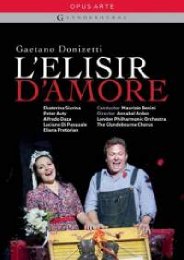
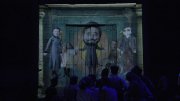
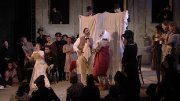

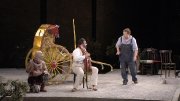
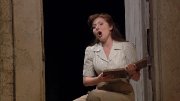


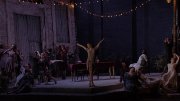







































Your Opinions and Comments
Be the first to post a comment!